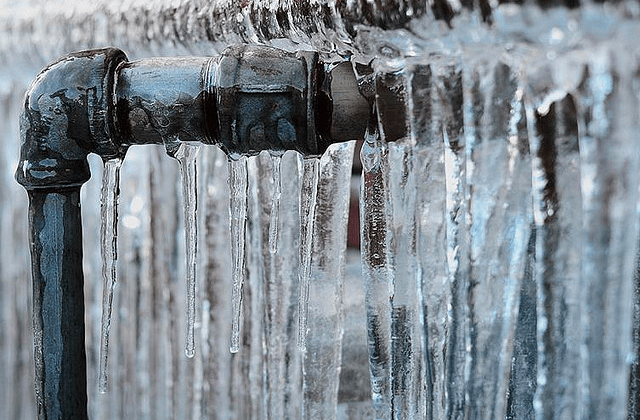Each person maintains their own rationale with regards to Prevent Frozen Pipes .

Winter can damage your pipes, particularly by freezing pipes. Here's just how to stop it from happening and what to do if it does.
Introduction
As temperature levels decrease, the threat of frozen pipes increases, possibly bring about expensive repair services and water damage. Comprehending just how to prevent frozen pipelines is vital for property owners in chilly environments.
Understanding Frozen Pipes
What triggers pipelines to freeze?
Pipelines ice up when revealed to temperature levels listed below 32 ° F (0 ° C) for expanded durations. As water inside the pipes freezes, it broadens, putting pressure on the pipe wall surfaces and potentially creating them to rupture.
Threats and damages
Frozen pipelines can lead to water disruptions, property damage, and pricey repairs. Burst pipes can flood homes and create extensive structural damage.
Indications of Frozen Water Lines
Recognizing icy pipes early can prevent them from bursting.
Exactly how to determine icy pipelines
Try to find reduced water flow from faucets, unusual odors or noises from pipes, and noticeable frost on revealed pipelines.
Avoidance Tips
Protecting susceptible pipes
Cover pipelines in insulation sleeves or use warm tape to secure them from freezing temperatures. Focus on pipelines in unheated or outside locations of the home.
Heating methods
Keep indoor areas effectively heated, particularly areas with plumbing. Open cupboard doors to allow cozy air to distribute around pipelines under sinks.
Shielding Exterior Pipes
Garden tubes and exterior taps
Disconnect and drain pipes garden pipes prior to winter months. Mount frost-proof faucets or cover exterior taps with shielded caps.
What to Do If Your Pipelines Freeze
Immediate activities to take
If you presume frozen pipelines, maintain faucets open to alleviate stress as the ice melts. Make use of a hairdryer or towels soaked in warm water to thaw pipes gradually.
Long-Term Solutions
Structural changes
Think about rerouting pipelines away from outside walls or unheated areas. Add extra insulation to attics, basements, and crawl spaces.
Upgrading insulation
Invest in high-quality insulation for pipelines, attic rooms, and wall surfaces. Correct insulation assists keep regular temperatures and decreases the threat of icy pipelines.
Verdict
Stopping frozen pipes requires positive actions and fast actions. By recognizing the reasons, signs, and preventive measures, property owners can shield their plumbing during cold weather.
Helpful Tips to Prevent Frozen Pipes this Winter
UNDERSTANDING THE BASICS: WHY PIPES FREEZE AND WHY IT’S A PROBLEM
Water freezing inside pipes is common during the winter months, but understanding why pipes freeze, and the potential problems it can cause is crucial in preventing such incidents. This section will delve into the basics of why pipes freeze and the associated problems that may arise.
THE SCIENCE BEHIND FROZEN PIPES
When water reaches freezing temperatures, it undergoes a physical transformation and solidifies into ice. This expansion of water as it freezes is the primary reason pipes can burst. As the water inside the pipe freezes, it expands, creating immense pressure on the walls. If the pressure becomes too great, the pipe can crack or rupture, leading to leaks and water damage.
FACTORS THAT CONTRIBUTE TO PIPE FREEZING
Low Temperatures: Extremely cold weather, especially below freezing, increases the risk of pipes freezing. Uninsulated or Poorly Insulated Pipes: Pipes located in unheated areas, such as basements, crawl spaces, or attics, are more prone to freezing. Insufficient insulation or lack of insulation altogether exacerbates the problem. Exterior Wall Exposure: Pipes running along exterior walls are susceptible to freezing as they encounter colder temperatures outside. Lack of Heating or Temperature Regulation: Inadequate heating or inconsistent temperature control in your home can contribute to frozen pipes. PROBLEMS CAUSED BY FROZEN PIPES
- Pipe Bursting: As mentioned earlier, the expansion of water as it freezes can cause pipes to burst, resulting in significant water damage.
- Water Damage: When pipes burst, it can lead to flooding and water damage to your property, including walls, ceilings, flooring, and personal belongings.
- Structural Damage: Prolonged exposure to water from burst pipes can compromise the structural integrity of your home, leading to costly repairs.
- Mold and Mildew Growth: Excess moisture from water damage can create a favorable environment for mold and mildew growth, posing health risks to occupants.
- Disrupted Water Supply: Frozen pipes can also result in a complete or partial loss of water supply until the issue is resolved.
WHY CERTAIN PIPES ARE MORE PRONE TO FREEZING
- Location: Pipes located in unheated or poorly insulated areas, such as basements, crawl spaces, attics, or exterior walls, are at higher risk of freezing.
- Exterior Pipes: Outdoor pipes, such as those used for irrigation or exposed plumbing, are particularly vulnerable to freezing as they are directly exposed to the elements.
- Supply Lines: Pipes that carry water from the main water supply into your home, including the main water line, are critical to protect as freezing in these lines can affect your entire plumbing system.
- Underground Pipes: Pipes buried underground, such as those connected to sprinkler systems or outdoor faucets, can be susceptible to freezing if not properly insulated.
https://busybusy.com/blog/helpful-tips-to-prevent-frozen-pipes-this-winter/

I am very curious about 6 Ways to Prevent Frozen Pipes and I hope you enjoyed reading our post. Do you know about anybody else who is interested by the niche? Do not hesitate to promote it. Thanks for being here. Come back soon.
Call Today